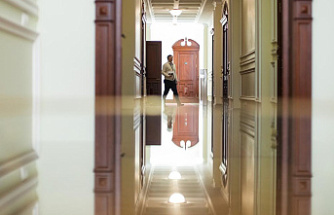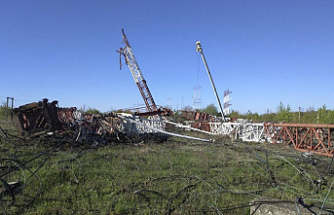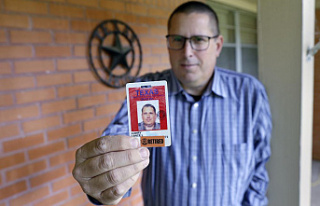Some arriving travellers removed their mandatory masks in order to see the faces that have been so far away.
Australia and other countries of the Asia-Pacific region have been subject to some of the strictest COVID-19 travel restrictions and pandemic lockdowns in the world. However, with the rise in vaccination rates and falling cases, many countries are starting to reopen.
Some countries, such as Japan and China, are still closed to foreign visitors. However, Thailand opened its doors substantially Monday. Many others have started or plan to follow their lead.
Carly Boyd, a traveler, jumped on the first flight from New York to surprise her parents. She hadn't seen them in three years.
She said that "just being able to return home without having to go into quarantine is huge" to reporters at Sydney's airport where "I Still Call Australia Home", the unofficial national anthem, was playing.
"There are many people on that flight who have lost loved ones or who are close to death. It's amazing for them to be able get off the plane to see them right away.
Thailand was home to 20% of the country's economy prior to the pandemic. The lockdown has led to massive job losses and hardship in Thailand. The government hopes that foreign tourists will help give the economy a boost.
Even though the surge in deaths caused by the delta virus of the virus was only a few short months ago, many Thais are still concerned about the possibility of new outbreaks.
Issarapong Paingam, a Bangkok taxi driver, lost his mother to COVID-19 in the recent surge. He said that it would be more sensible for the government to concentrate its attention on domestic reopening before adding foreign tourists to the mix.
The 34-year old said that the government had not yet informed the public about what it would do in case of another outbreak. I don't get why they won't allow people to live normal lives in order to observe the trend (of COVID-19) before welcoming tourists.
Thailand allowed citizens to travel while the pandemic was raging, but required a strict quarantine of two weeks in hotels designated for those entering the country.
The number of foreign arrivals dropped from 40 million in 2019, to 6.69 millions in 2020 -- almost all during the three months prior to the pandemic restrictions being introduced -- to less than 100,000 by 2021.
Monday's reopening is based on a pilot program that was launched in July on Phuket Island. This allowed travelers fully vaccinated from certain countries to move around the island rather than in a hotel.
Beginning Monday, travelers who have been fully vaccinated in one of the 63 territories and countries deemed low risk -- some cynical Thais noted that this is more based on spending power than coronavirus infection -- will be exempted from quarantine. They must spend one night in a designated hotel before they can check out. After that, they are allowed to travel after having passed the COVID-19 test.
Quarantine rules apply to travelers from non-preferred countries or unvaccinated individuals.
In the destination areas, restrictions are being eased, including widespread reopenings of businesses and other facilities, such as schools, hospitals, tattoo shops, and department stores.
Supat Hasuwannakit is the president of Thailand's Rural Doctor Society. He said that he doesn't worry about foreign tourists causing a surge in cases because of the combination of tight screening and higher vaccination rates in Thailand.
He said that he was concerned about the planned reopening bars and clubs in December. He also pointed out that the recent outbreaks of domestic disease were caused by the government allowing people to gather for religious services and weddings.
He said that once people begin to gather and eat, there is a high chance of a new outbreak. COVID-19 can easily spread to bars and nightclubs that have poor airflow.
As with other countries in the region, rules requiring distancing and masks remain in effect.
India saw an increase of over 400,000 cases per day in April and May. Officials have warned that India's holiday season will be marked by increased restrictions.
India started granting tourist visas to fully vaccinated passengers on charter flights on October 15th. They will also extend them to tourists flying on commercial flights beginning Nov. 15.
Sri Lanka, a neighbor, has begun to allow fully-vaccinated travelers without quarantines and partially-vaccinated individuals with some restrictions. Similar programs are being implemented in South Korea, where on Monday, larger social gatherings were allowed and operating hours were lifted on restaurants.
Vietnam remains closed, but plans to open Phu Quoc, a popular resort island, to fully vaccinated tourists by the end the month. Cambodia, which lifted domestic travel restrictions Monday, also has a similar plan, opening two provinces along the coast to international visitors. Malaysia plans to fully vaccinate tourists to its northern resort island Langkawi by Nov. 15.
Australia believes that the current vaccination rates are high enough to reduce the risk of international travel.
At first, only Australian citizens and permanent residents will be allowed to enter the country. International tourists will have priority over fully vaccinated foreigners who are traveling on student or skilled worker visas.
The government believes that Australia will be welcoming international tourists to its shores by the end of the year.
Australia already announced Monday that it will accept vaccinated tourists from Singapore, which has one the highest vaccination rates in world, starting Nov. 21 pursuant to a bilateral agreement.
These new freedoms allow fully vaccinated Australian citizens and permanent residents to leave the country without having to ask the government for an exemption from the travel ban that has kept most Australians at home since March 25, 2020.
Sydney was the first Australian airport that announced it would reopen on Monday. New South Wales was the state in which 80% of its population was fully vaccinated. After Victoria and the Australian Capital Territory had met the vaccination benchmark, Canberra and Melbourne opened their doors on Monday.
Although Australians can now travel internationally, four Australian states as well as a territory still have pandemic restrictions that prevent them from crossing state borders.
Australian Ethen Carter, who arrived at Sydney's airport on Monday from Los Angeles, expressed frustration at the need to apply for permission in order to visit his mother in Western Australia.
He appealed to Western Australia Premier Mark McGowan through the media, who said that the state border would not be open this year.
"Mark, think about the people who are suffering mentally. Carter stated that this is also a health problem. "And while we understand that we have to protect lives, we also know you need to bring families back together.
McGowan stated that his government would allow Carter to enter the country if he applied for an exemption.
McGowan stated that these situations are extremely sad and difficult. He had seen many of them over the past two years.












